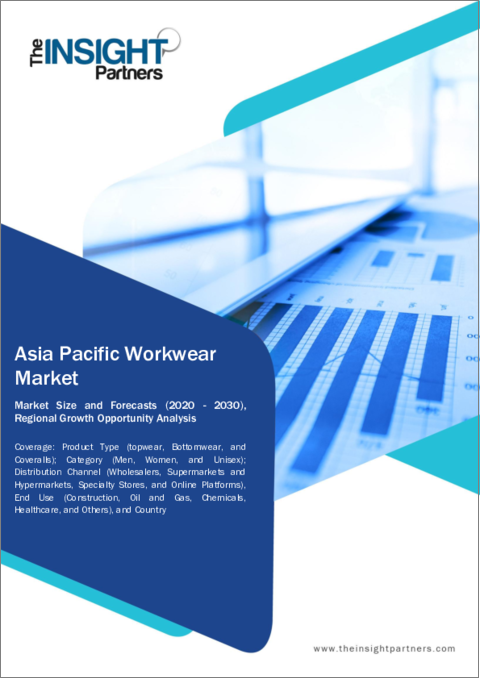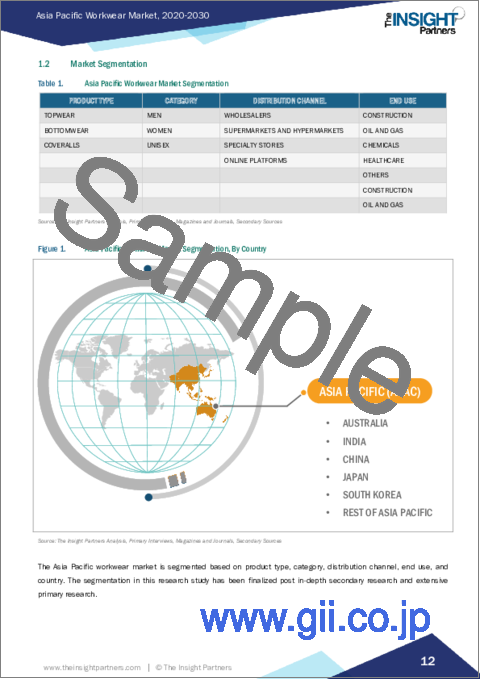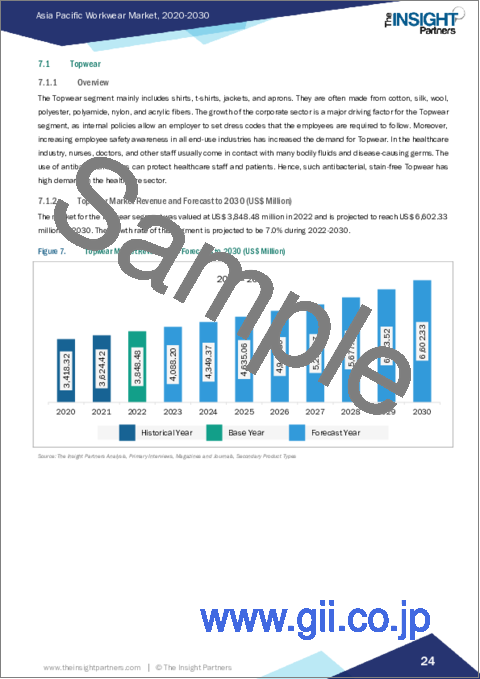|
|
市場調査レポート
商品コード
1562305
アジア太平洋のワークウェア市場の2030年予測-地域別分析-製品タイプ、カテゴリー、流通チャネル、最終用途別Asia Pacific Workwear Market Forecast to 2030 - Regional Analysis - by Product Type, Category, Distribution Channel, and End Use |
||||||
|
|||||||
| アジア太平洋のワークウェア市場の2030年予測-地域別分析-製品タイプ、カテゴリー、流通チャネル、最終用途別 |
|
出版日: 2024年07月04日
発行: The Insight Partners
ページ情報: 英文 79 Pages
納期: 即納可能
|
全表示
- 概要
- 図表
- 目次
アジア太平洋のワークウェア市場は、2022年に83億5,973万米ドルと評価され、2030年には144億9,505万米ドルに達すると予測され、2022~2030年のCAGRは7.1%と推定されます。
厳しい政府規制の採用がアジア太平洋のワークウェア市場を後押し
労働者の間で職場の安全や起こりうる健康被害に関する知識が不足していることは、世界的に重要な問題です。同じことに関する意識を高めるため、多くの政府・非政府組織が労働者の健康と安全に関する様々なプログラムやキャンペーンを導入しています。例えば、中国の標準化管理局はGB 38453~2019を発行しました。この義務国家規格は2020年7月1日に発効しました。これは、2019年に新たに認可された国家規格に関する中国の通知第17号に記載されているように、新たな義務国家規格です。さらに、中国工業情報化部はカジュアルウェアの業界標準FZ/T 81007~2022の更新版を発表しました。これは2022年に承認された業界標準の第10号発表に含まれ、2022年10月1日に旧版のFZ/T 81007~2012に取って代わった。このように、産業部門に厳しい規制枠組みを導入することが、この地域の市場成長を支えています。
アジア太平洋のワークウェア市場概要
アジア太平洋のワークウェア市場は、中国、インド、オーストラリア、日本、韓国、その他のアジア太平洋に区分されます。これらの新興国は、労働安全専攻と労働安全への支出の急増を確認しており、ワークウェア市場の主要市場参入企業に十分な機会を提供しています。アジア太平洋は、労働災害の増加、貧弱なインフラ、職場での死亡率削減の取り組みにより、著名な世界ワークウェア市場のひとつです。国際労働機関(ILO)によると、2021年には毎年、アジア太平洋で110万人以上が労働災害や労働関連疾患で命を落としています。インドのような国々は、最も保護されておらず、最も情報に疎く、最も訓練されていない労働力の供給源です。女性、子ども、障害者、移民労働者、少数民族が最も影響を受ける人々であり、労働災害に巻き込まれることが多いです。したがって、このような労働災害を減らすために、建設、製造、石油・ガスなどの業界は、従業員の労働安全に幅広く投資しています。したがって、労働安全に関する意識の高まりがアジア太平洋の需要を牽引しています。また、アジア太平洋では、世界保健機関(WHO)、国際労働機関(ILO)、食品医薬品局(FDA)などの組織を通じて、発展途上国における健康衛生や作業インフラ強化に関する意識を高めるキャンペーンが増加しており、産業界における産業用ワークウェアや医療用ワークウェアの需要を後押ししています。
さらに、COVID-19以降、この地域では医療産業が台頭してきました。医療従事者の安全への関心の高まり、衛生基準の向上、この地域における新興企業や医療機器企業の増加が、ワークウェア市場の拡大に寄与しています。さらに、アジアにおける低侵襲治療の利用可能性に関する意識の高まりが、医療用ワークウェア市場の成長を後押ししています。
アジア太平洋のワークウェア市場の収益と2030年までの予測(金額)
アジア太平洋のワークウェア市場のセグメンテーション
アジア太平洋のワークウェア市場は、製品タイプ、カテゴリー、最終用途、流通チャンネル、国別に区分されます。
製品タイプに基づき、アジア太平洋のワークウェア市場はトップウェア、ボトムウェア、カバーオールに二分されます。トップウェアセグメントは2022年に最大のシェアを占めました。
カテゴリー別では、アジア太平洋のワークウェア市場は男性、女性、ユニセックスに区分されます。男性セグメントが2022年に最大のシェアを占めました。
流通チャンネル別では、アジア太平洋のワークウェア市場は卸売業者、スーパーマーケットとハイパーマーケット、専門店、オンラインプラットフォームに区分されます。卸売業者セグメントが2022年に最大のシェアを占めました。
最終用途別では、アジア太平洋のワークウェア市場は建設、石油・ガス、化学、医療、その他に区分されます。その他セグメントが2022年に最大のシェアを占めました。
国別では、アジア太平洋のワークウェア市場はオーストラリア、中国、インド、日本、韓国、その他のアジア太平洋に分類されます。中国が2022年のアジア太平洋のワークウェア市場を独占しました。
ARAMARK社、Alisco Group社、3M社、Honeywell International Inc.社、Lakeland Industries Inc.社は、アジア太平洋のワークウェア市場で事業を展開している主要企業です。
目次
第1章 イントロダクション
第2章 エグゼクティブサマリー
- 主要洞察
- 市場の魅力
- 市場の魅力
第3章 調査手法
- 調査範囲
- 2次調査
- 1次調査
第4章 アジア太平洋のワークウェア市場情勢
- イントロダクション
- PEST分析
- アジア太平洋
第5章 アジア太平洋のワークウェア市場:主要市場力学
- 市場促進要因
- 労働災害件数の増加
- 厳しい政府規制の採用
- 市場抑制要因
- 産業オートメーションの採用増加
- 市場機会
- 新興経済圏からの需要の増加
- eコマース流通チャンネルの採用
- 今後の動向
- 最新技術による製品イノベーションの増加
- 影響分析
第6章 ワークウェア市場:アジア太平洋市場分析
- アジア太平洋のワークウェア市場収益
- アジア太平洋のワークウェア市場の予測と分析
第7章 アジア太平洋のワークウェア市場分析-製品タイプ
- トップウェア
- トップウェア市場規模、収益と2030年までの予測
- ボトムウェア
- ボトムウェア概要
- ボトムウェア市場規模、収益と2030年までの予測
- カバーオール
- カバーオール概要
- カバーオール市場規模、収益と2030年までの予測
第8章 アジア太平洋のワークウェア市場分析-カテゴリー
- 男性用
- 男性市場、収益と2030年までの予測
- 女性
- 女性市場、収益と2030年までの予測
- ユニセックス
- ユニセックス概要
- ユニセックス市場、収益と2030年までの予測
第9章 アジア太平洋のワークウェア市場分析:流通チャンネル
- 卸売
- 卸売市場の収益と2030年までの予測
- スーパーマーケットとハイパーマーケット
- スーパーマーケットとハイパーマーケット市場の収益と2030年までの予測
- 専門店
- 専門店概要
- 専門店市場規模、収益と2030年までの予測
- オンラインプラットフォーム
- オンラインプラットフォーム市場規模、収益と2030年までの予測
第10章 アジア太平洋のワークウェア市場分析:最終用途
- 建設
- 建設市場の規模、収益と2030年までの予測
- 石油・ガス
- 石油・ガス市場の収益と2030年までの予測
- 化学品
- 化学品市場の収益と2030年までの予測
- 医療
- 医療市場の収益と2030年までの予測
- その他
- その他市場の収益と2030年までの予測
第11章 アジア太平洋のワークウェア市場:国別分析
- アジア太平洋
- オーストラリア
- 中国
- インド
- 日本
- 韓国
- その他のアジア太平洋
第12章 業界情勢
- イントロダクション
- 事業計画と戦略
- 製品ニュース
第13章 企業プロファイル
- ARAMARK
- Alisco Group
- 3M
- Honeywell International Inc.
- Lakeland Industries Inc.
第14章 付録
List Of Tables
- Table 1. Asia Pacific Workwear Market Segmentation
- Table 2. Asia Pacific Workwear Market Revenue and Forecasts to 2030 (US$ Million)
- Table 3. Asia Pacific Workwear Market Revenue and Forecasts to 2030 (US$ Million) - Product Type
- Table 4. Asia Pacific Workwear Market Revenue and Forecasts to 2030 (US$ Million) - Category
- Table 5. Asia Pacific Workwear Market Revenue and Forecasts to 2030 (US$ Million) - Distribution Channel
- Table 6. Asia Pacific Workwear Market Revenue and Forecasts to 2030 (US$ Million) - End Use
- Table 7. Australia Workwear Market Revenue and Forecasts to 2030 (US$ Million) - By Product Type
- Table 8. Australia Workwear Market Revenue and Forecasts to 2030 (US$ Million) - By Category
- Table 9. Australia Workwear Market Revenue and Forecasts to 2030 (US$ Million) - By Distribution Channel
- Table 10. Australia Workwear Market Revenue and Forecasts to 2030 (US$ Million) - By End Use
- Table 11. China Workwear Market Revenue and Forecasts to 2030 (US$ Million) - By Product Type
- Table 12. China Workwear Market Revenue and Forecasts to 2030 (US$ Million) - By Category
- Table 13. China Workwear Market Revenue and Forecasts to 2030 (US$ Million) - By Distribution Channel
- Table 14. China Workwear Market Revenue and Forecasts to 2030 (US$ Million) - By End Use
- Table 15. India Workwear Market Revenue and Forecasts to 2030 (US$ Million) - By Product Type
- Table 16. India Workwear Market Revenue and Forecasts to 2030 (US$ Million) - By Category
- Table 17. India Workwear Market Revenue and Forecasts to 2030 (US$ Million) - By Distribution Channel
- Table 18. India Workwear Market Revenue and Forecasts to 2030 (US$ Million) - By End Use
- Table 19. Japan Workwear Market Revenue and Forecasts to 2030 (US$ Million) - By Product Type
- Table 20. Japan Workwear Market Revenue and Forecasts to 2030 (US$ Million) - By Category
- Table 21. Japan Workwear Market Revenue and Forecasts to 2030 (US$ Million) - By Distribution Channel
- Table 22. Japan Workwear Market Revenue and Forecasts to 2030 (US$ Million) - By End Use
- Table 23. South Korea Workwear Market Revenue and Forecasts to 2030 (US$ Million) - By Product Type
- Table 24. South Korea Workwear Market Revenue and Forecasts to 2030 (US$ Million) - By Category
- Table 25. South Korea Workwear Market Revenue and Forecasts to 2030 (US$ Million) - By Distribution Channel
- Table 26. South Korea Workwear Market Revenue and Forecasts to 2030 (US$ Million) - By End Use
- Table 27. Rest of Asia Pacific Workwear Market Revenue and Forecasts to 2030 (US$ Million) - By Product Type
- Table 28. Rest of Asia Pacific Workwear Market Revenue and Forecasts to 2030 (US$ Million) - By Category
- Table 29. Rest of Asia Pacific Workwear Market Revenue and Forecasts to 2030 (US$ Million) - By Distribution Channel
- Table 30. Rest of Asia Pacific Workwear Market Revenue and Forecasts to 2030 (US$ Million) - By End Use
List Of Figures
- Figure 1. Asia Pacific Workwear Market Segmentation, By Country
- Figure 2. Asia Pacific: PEST Analysis
- Figure 3. Market Dynamics: Asia Pacific Workwear Market
- Figure 4. Asia Pacific Workwear Market Impact Analysis of Drivers and Restraints
- Figure 5. Asia Pacific Workwear Market Revenue (US$ Million), 2020 - 2030
- Figure 6. Workwear Market Share (%) - Product Type, 2022 and 2030
- Figure 7. Topwear Market Revenue and Forecasts to 2030 (US$ Million)
- Figure 8. Bottomwear Market Revenue and Forecasts to 2030 (US$ Million)
- Figure 9. Coveralls Market Revenue and Forecasts to 2030 (US$ Million)
- Figure 10. Asia Pacific Workwear Market Share (%) - Category, 2022 and 2030
- Figure 11. Men Market Revenue and Forecasts to 2030 (US$ Million)
- Figure 12. Women Market Revenue and Forecasts to 2030 (US$ Million)
- Figure 13. Unisex Market Revenue and Forecasts to 2030 (US$ Million)
- Figure 14. Asia Pacific Workwear Market Share (%) - Distribution Channel, 2022 and 2030
- Figure 15. Wholesalers Market Revenue and Forecasts to 2030 (US$ Million)
- Figure 16. Supermarkets and Hypermarkets Market Revenue and Forecasts to 2030 (US$ Million)
- Figure 17. Specialty Stores Market Revenue and Forecasts to 2030 (US$ Million)
- Figure 18. Online Platforms Market Revenue and Forecasts to 2030 (US$ Million)
- Figure 19. Asia Pacific Workwear Market Share (%) - End Use, 2022 and 2030
- Figure 20. Construction Market Revenue and Forecasts to 2030 (US$ Million)
- Figure 21. Oil and Gas Market Revenue and Forecasts to 2030 (US$ Million)
- Figure 22. Chemicals Market Revenue and Forecasts to 2030 (US$ Million)
- Figure 23. Healthcare Market Revenue and Forecasts to 2030 (US$ Million)
- Figure 24. Others Market Revenue and Forecasts to 2030 (US$ Million)
- Figure 25. Asia Pacific Workwear Market, by Key Country - Revenue (2022) (US$ Million)
- Figure 26. Asia Pacific Workwear Market Breakdown by Key Countries, 2022 and 2030 (%)
- Figure 27. Australia Workwear Market Revenue and Forecasts to 2030 (US$ Million)
- Figure 28. China Workwear Market Revenue and Forecasts to 2030 (US$ Million)
- Figure 29. India Workwear Market Revenue and Forecasts to 2030 (US$ Million)
- Figure 30. Japan Workwear Market Revenue and Forecasts to 2030 (US$ Million)
- Figure 31. South Korea Workwear Market Revenue and Forecasts to 2030 (US$ Million)
- Figure 32. Rest of Asia Pacific Workwear Market Revenue and Forecasts to 2030 (US$ Million)
The Asia Pacific workwear market was valued at US$ 8,359.73 million in 2022 and is expected to reach US$ 14,495.05 million by 2030; it is estimated to register at a CAGR of 7.1% from 2022 to 2030.
Introduction of Stringent Government Regulations Boosts Asia Pacific Workwear Market
The lack of knowledge regarding workplace safety and probable health hazards among workers is a significant global concern. To raise awareness regarding the same, many government and non-government organizations are introducing various programs and campaigns related to the health and safety of the workers. For instance, China's Standardization Administration issued GB 38453-2019, an obligatory national standard for protective gear against heat. The required national standard took effect on July 1, 2020. This is a new mandatory national standard, as stated in China's No. 17 notification on newly authorized national standards for 2019. Additionally, the Chinese Ministry of Industry and Information Technology has published an updated industry standard for casual clothes, FZ/T 81007-2022. It was included in No. 10's release of approved industry standards in 2022 and replaced the previous version, FZ/T 81007-2012, on October 1, 2022. Thus, introducing a stringent regulatory framework for the industrial sector supports the region's market growth.
Asia Pacific Workwear Market Overview
The Asia Pacific workwear market is segmented into China, India, Australia, Japan, South Korea, and the Rest of Asia Pacific. These emerging countries are witnessing an upsurge in work safety majors and expenditures on work safety, which offers ample opportunities for the key market players in the workwear market. Asia Pacific is one of the prominent global workwear markets due to the rising number of occupational accidents, poor infrastructure, and initiatives to reduce workplace fatality rates. According to the International Labour Organization (ILO), in 2021, every year, more than 1.1 million people lose their lives to occupational accidents or work-related diseases in Asia Pacific. The countries such as India are the source of the least protected, least informed, and least trained workforce. Women, children, disabled workers, migrant workers, and ethnic minorities are the most affected populations and are often involved in occupational accidents. Hence, to reduce such occupational accidents and injuries, industries such as construction, manufacturing, and oil & gas are extensively investing in the work safety of their employees. Hence, the increasing awareness regarding work safety drives the demand in the Asia Pacific region. Besides, the increasing number of campaigns through organizations such as the World Health Organization (WHO), the International Labor Organization (ILO), and the Food & Drug Administration (FDA) in the Asia Pacific in this region to raise awareness related to health hygiene and enhancing work infrastructure in developing countries is propelling the demand for industrial, and healthcare workwear in industry.
Further, since COVID-19, the healthcare industry has emerged in this region. The rising focus on healthcare worker safety, increasing hygiene standards, and the growing number of startups and medical device companies in this region contribute to the workwear market expansion. Further, the rising awareness regarding the availability of minimally invasive treatments in Asia is propelling the healthcare workwear market growth.
Asia Pacific Workwear Market Revenue and Forecast to 2030 (US$ Million)
Asia Pacific Workwear Market Segmentation
The Asia Pacific workwear market is segmented based on product type, category, end use, distribution channel, and country.
Based on product type, the Asia Pacific workwear market is bifurcated into topwear, bottomwear, and coveralls. The topwear segment held the largest share in 2022.
In terms of category, the Asia Pacific workwear market is segmented into men, women, and unisex. The men segment held the largest share in 2022.
Based on distribution channel, the Asia Pacific workwear market is segmented into wholesalers, supermarkets and hypermarkets, specialty stores, and online platforms. The wholesalers segment held the largest share in 2022.
By end use, the Asia Pacific workwear market is segmented into construction, oil and gas, chemicals, healthcare, and others. The others segment held the largest share in 2022.
Based on country, the Asia Pacific workwear market is categorized into Australia, China, India, Japan, South Korea, and the Rest of Asia Pacific. China dominated the Asia Pacific workwear market in 2022.
ARAMARK, Alisco Group, 3M, Honeywell International Inc., and Lakeland Industries Inc are some of the leading companies operating in the Asia Pacific workwear market.
Table Of Contents
1. Introduction
- 1.1 The Insight Partners Research Report Guidance
- 1.2 Market Segmentation
2. Executive Summary
- 2.1 Key Insights
- 2.2 Market Attractiveness
- 2.2.1 Market Attractiveness
3. Research Methodology
- 3.1 Coverage
- 3.2 Secondary Research
- 3.3 Primary Research
4. Asia Pacific Workwear Market Landscape
- 4.1 Overview
- 4.2 PEST Analysis
- 4.2.1 Asia Pacific
5. Asia Pacific Workwear Market - Key Market Dynamics
- 5.1 Market Drivers
- 5.1.1 Increase in the Number of Industrial Accidents
- 5.1.2 Introduction of Stringent Government Regulations
- 5.2 Market Restraints
- 5.2.1 Increased Adoption of Industrial Automation
- 5.3 Market Opportunities
- 5.3.1 Increasing Demand from Emerging Economies
- 5.3.2 Adoption of E-commerce Sales Channel
- 5.4 Future Trends
- 5.4.1 Increasing Product Innovation with the Latest Technologies
- 5.5 Impact Analysis
6. Workwear Market - Asia Pacific Market Analysis
- 6.1 Asia Pacific Workwear Market Revenue (US$ Million)
- 6.2 Asia Pacific Workwear Market Forecast and Analysis
7. Asia Pacific Workwear Market Analysis - Product Type
- 7.1 Topwear
- 7.1.1 Overview
- 7.1.2 Topwear Market Revenue and Forecast to 2030 (US$ Million)
- 7.2 Bottomwear
- 7.2.1 Overview
- 7.2.2 Bottomwear Market Volume, Revenue and Forecast to 2030 (US$ Million)
- 7.3 Coveralls
- 7.3.1 Overview
- 7.3.2 Coveralls Market Volume, Revenue and Forecast to 2030 (US$ Million)
8. Asia Pacific Workwear Market Analysis - Category
- 8.1 Men
- 8.1.1 Overview
- 8.1.2 Men Market, Revenue and Forecast to 2030 (US$ Million)
- 8.2 Women
- 8.2.1 Overview
- 8.2.2 Women Market, Revenue and Forecast to 2030 (US$ Million)
- 8.3 Unisex
- 8.3.1 Overview
- 8.3.2 Unisex Market, Revenue and Forecast to 2030 (US$ Million)
9. Asia Pacific Workwear Market Analysis - Distribution Channel
- 9.1 Wholesalers
- 9.1.1 Overview
- 9.1.2 Wholesalers Market Revenue and Forecast to 2030 (US$ Million)
- 9.2 Supermarkets and Hypermarkets
- 9.2.1 Overview
- 9.2.2 Supermarkets and Hypermarkets Market Revenue and Forecast to 2030 (US$ Million)
- 9.3 Specialty Stores
- 9.3.1 Overview
- 9.3.2 Specialty Stores Market Volume, Revenue and Forecast to 2030 (US$ Million)
- 9.4 Online Platforms
- 9.4.1 Overview
- 9.4.2 Online Platforms Market Volume, Revenue and Forecast to 2030 (US$ Million)
10. Asia Pacific Workwear Market Analysis - End Use
- 10.1 Construction
- 10.1.1 Overview
- 10.1.2 Construction Market, Revenue, and Forecast to 2030 (US$ Million)
- 10.2 Oil and Gas
- 10.2.1 Overview
- 10.2.2 Oil and Gas Market Revenue, and Forecast to 2030 (US$ Million)
- 10.3 Chemicals
- 10.3.1 Overview
- 10.3.2 Chemicals Market Revenue and Forecast to 2030 (US$ Million)
- 10.4 Healthcare
- 10.4.1 Overview
- 10.4.2 Healthcare Market Revenue and Forecast to 2030 (US$ Million)
- 10.5 Others
- 10.5.1 Overview
- 10.5.2 Others Market Revenue and Forecast to 2030 (US$ Million)
11. Asia Pacific Workwear Market -Country Analysis
- 11.1 Asia Pacific
- 11.1.1 Asia Pacific Workwear Market Overview
- 11.1.2 Asia Pacific Workwear Market Revenue and Forecasts and Analysis - By Countries
- 11.1.2.1 Asia Pacific Workwear Market Breakdown by Country
- 11.1.2.2 Australia Workwear Market Revenue and Forecasts to 2030 (US$ Million)
- 11.1.2.2.1 Australia Workwear Market Breakdown by Product Type
- 11.1.2.2.2 Australia Workwear Market Breakdown by Category
- 11.1.2.2.3 Australia Workwear Market Breakdown by Distribution Channel
- 11.1.2.2.4 Australia Workwear Market Breakdown by End Use
- 11.1.2.3 China Workwear Market Revenue and Forecasts to 2030 (US$ Million)
- 11.1.2.3.1 China Workwear Market Breakdown by Product Type
- 11.1.2.3.2 China Workwear Market Breakdown by Category
- 11.1.2.3.3 China Workwear Market Breakdown by Distribution Channel
- 11.1.2.3.4 China Workwear Market Breakdown by End Use
- 11.1.2.4 India Workwear Market Revenue and Forecasts to 2030 (US$ Million)
- 11.1.2.4.1 India Workwear Market Breakdown by Product Type
- 11.1.2.4.2 India Workwear Market Breakdown by Category
- 11.1.2.4.3 India Workwear Market Breakdown by Distribution Channel
- 11.1.2.4.4 India Workwear Market Breakdown by End Use
- 11.1.2.5 Japan Workwear Market Revenue and Forecasts to 2030 (US$ Million)
- 11.1.2.5.1 Japan Workwear Market Breakdown by Product Type
- 11.1.2.5.2 Japan Workwear Market Breakdown by Category
- 11.1.2.5.3 Japan Workwear Market Breakdown by Distribution Channel
- 11.1.2.5.4 Japan Workwear Market Breakdown by End Use
- 11.1.2.6 South Korea Workwear Market Revenue and Forecasts to 2030 (US$ Million)
- 11.1.2.6.1 South Korea Workwear Market Breakdown by Product Type
- 11.1.2.6.2 South Korea Workwear Market Breakdown by Category
- 11.1.2.6.3 South Korea Workwear Market Breakdown by Distribution Channel
- 11.1.2.6.4 South Korea Workwear Market Breakdown by End Use
- 11.1.2.7 Rest of Asia Pacific Workwear Market Revenue and Forecasts to 2030 (US$ Million)
- 11.1.2.7.1 Rest of Asia Pacific Workwear Market Breakdown by Product Type
- 11.1.2.7.2 Rest of Asia Pacific Workwear Market Breakdown by Category
- 11.1.2.7.3 Rest of Asia Pacific Workwear Market Breakdown by Distribution Channel
- 11.1.2.7.4 Rest of Asia Pacific Workwear Market Breakdown by End Use
12. Industry Landscape
- 12.1 Overview
- 12.2 Business Planning and Strategy
- 12.3 Product News
13. Company Profiles
- 13.1 ARAMARK
- 13.1.1 Key Facts
- 13.1.2 Business Description
- 13.1.3 Products and Services
- 13.1.4 Financial Overview
- 13.1.5 SWOT Analysis
- 13.1.6 Key Developments
- 13.2 Alisco Group
- 13.2.1 Key Facts
- 13.2.2 Business Description
- 13.2.3 Products and Services
- 13.2.4 Financial Overview
- 13.2.5 SWOT Analysis
- 13.2.6 Key Developments
- 13.3 3M
- 13.3.1 Key Facts
- 13.3.2 Business Description
- 13.3.3 Products and Services
- 13.3.4 Financial Overview
- 13.3.5 SWOT Analysis
- 13.3.6 Key Developments
- 13.4 Honeywell International Inc.
- 13.4.1 Key Facts
- 13.4.2 Business Description
- 13.4.3 Products and Services
- 13.4.4 Financial Overview
- 13.4.5 SWOT Analysis
- 13.4.6 Key Developments
- 13.5 Lakeland Industries Inc.
- 13.5.1 Key Facts
- 13.5.2 Business Description
- 13.5.3 Products and Services
- 13.5.4 Financial Overview
- 13.5.5 SWOT Analysis
- 13.5.6 Key Developments






